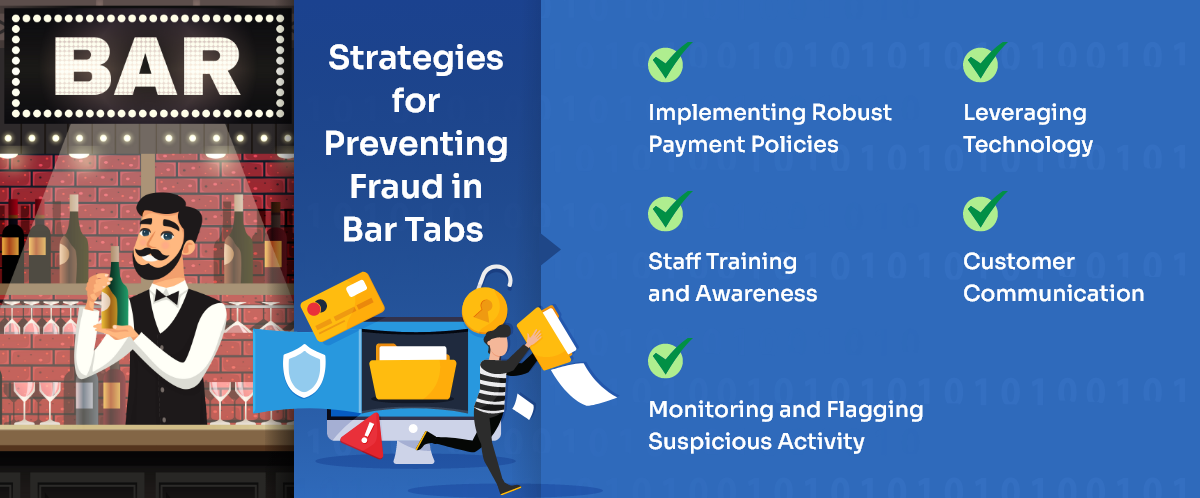Financial security isn’t just a concern for big corporations – it’s a day-to-day priority in the hospitality industry.
For bars in particular, managing finances goes beyond balancing sales and expenses. Fraud and chargebacks are growing challenges that can quickly eat into profits and damage customer relationships.
According to a report from Chargeback Gurus and Juniper Research, the travel and hospitality industry racked up about $25 billion in chargebacks in 2023.
Bar tabs, while convenient for both customers and staff, are uniquely vulnerable. Without proper safeguards, they open the door to fraudulent activity, disputes, and operational headaches.
Let’s take a closer look at why bar tabs present these risks – and more importantly, what you can do to protect your business.
What Are Bar Tabs?
A bar tab is a system that allows customers to order drinks and pay for them all at once, usually at the end of the night. Instead of handling payment after every round, a tab keeps the evening flowing smoothly for both guests and staff.
Bar tabs can be managed in a few different ways:
- Manual Tabs – The traditional method, where staff write down orders and keep track of balances by hand. Still common in smaller venues, this approach is straightforward and familiar.
- Digital Tabs – Managed through a point-of-sale (POS) system, where each order is logged automatically. This makes it easier for staff to keep track of open tabs, review totals, and close them quickly.
- App-Based Tabs – A more modern option that lets customers open, monitor, and close their tabs directly from their smartphones. These give guests greater flexibility while streamlining service for the bar.
No matter which approach a venue uses, the purpose is the same: to create a more convenient, seamless experience. Customers enjoy the ease of ordering without constant payment interruptions, and bars benefit from smoother service and higher customer satisfaction.
Financial and Operational Impacts of Fraud and Chargebacks

Fraudulent activity and chargebacks don’t just hurt your bottom line in the short term – they create ripple effects that impact your entire operation. From day-to-day disruptions to long-term financial strain, the consequences go far beyond a single unpaid tab.
Direct Financial Losses
At the most basic level, every fraudulent tab or illegitimate chargeback is money lost. Unlike a simple customer return, these losses are often unrecoverable and can add up quickly, especially for busy bars where multiple disputes may happen in a single month.
Increased Processing Costs and Penalties
Payment processors track chargeback ratios closely. If your bar racks up too many, you could face higher transaction fees, stricter account rules, or, in the worst cases, lose your merchant account entirely. That not only makes transactions more expensive but also threatens your ability to accept card payments – a dealbreaker for most customers.
Operational Disruptions
Every dispute takes time and attention away from what your staff does best: serving guests. Instead of focusing on hospitality, managers and staff have to gather receipts, pull reports, and respond to chargeback claims. Over time, this administrative burden can create serious inefficiencies behind the bar.
Damage to Reputation and Customer Trust
Bars thrive on atmosphere and customer loyalty. But if disputes become a common issue, guests may hesitate to leave a card on file or feel uneasy about opening a tab. Even the perception of insecure payment handling can lead to fewer repeat customers and negative word-of-mouth.
Long-Term Impact on Profitability
When fraud and chargebacks happen consistently, they slowly eat away at profits. Margins in hospitality are already tight, so repeated financial hits – combined with added fees and lost time –can stall your bar’s growth and limit opportunities for reinvestment.
Inconsistent or Distorted Inventory
Fraudulent tabs don’t just affect the register; they throw off your inventory tracking too. If drinks go out but payment never comes in, it creates discrepancies that make forecasting and restocking more difficult. Over time, this can distort sales data and lead to poor purchasing decisions.
Common Fraud Scenarios in Bar Tabs
While bar tabs are designed to make service smooth and convenient, they also introduce opportunities for fraud.
Understanding the most common scenarios can help you spot risks early and put safeguards in place.
Stolen or Unauthorized Credit Cards
Fraudsters may open a tab using a stolen or cloned card. Drinks and food are consumed, but once the cardholder disputes the charges, your bar is left covering the cost. Because tabs are often left open for hours, fraudulent charges can accumulate quickly before anyone notices.
Tab Abandonment
One of the simplest forms of fraud happens when customers walk out without closing their tab. Whether intentional or not, abandoned tabs leave the bar with unpaid balances and create time-consuming follow-up work for staff.
Disputed Charges
Sometimes, guests claim they never ordered certain drinks or deny making purchases altogether. These disputes may be honest mistakes – or deliberate attempts to avoid payment – but either way, they often lead to chargebacks that cost your business money and time. Implementing ways to reduce chargebacks and proper documentation improves your chances to dispute them successfully.
Internal Fraud by Staff
Unfortunately, not all fraud comes from customers. Employees with access to open tabs may manipulate entries, serve drinks without logging them, or pocket cash payments. Even small acts of dishonesty can add up over time and distort your sales and inventory records.
Card Swaps / Misuse
In busy bar environments, it’s not uncommon for cards to be swapped accidentally – or intentionally – between customers. This creates confusion at closing time, often resulting in disputes, chargebacks, and damaged trust between guests and staff.
Over-Ordering with No Intention to Pay
Some patrons take advantage of the “pay later” model by running up large tabs they never plan to settle. By the time staff realize the customer is gone, the loss is already on the books, and inventory has been depleted without revenue to cover it.
Strategies for Preventing Fraud in Bar Tabs

So, how can you protect your bar from these risks? The answer lies in a thoughtful mix of policies, technology, and awareness.
By tightening up procedures and making fraud prevention part of daily operations, you can reduce risks while still keeping the customer experience smooth and enjoyable.
1. Implementing Robust Payment Policies
Strong payment policies create the foundation for bar tab fraud prevention. Require a valid credit card to open a tab and, when possible, pre-authorize the card to verify funds. Setting reasonable limits for unpaid tabs can also minimize losses if a customer walks out or disputes charges later. Some bars also place a small hold on cards, which reassures staff that the payment method is valid.
2. Leveraging Technology
Technology has become one of the most powerful tools against fraud.
- POS Systems – Modern POS systems do more than process sales. They automate tracking, link orders directly to customer profiles, and provide detailed reporting for accountability.
- Contactless Payments – Faster, safer, and less prone to card skimming, contactless options reduce physical handling of cards, enhancing bar payment security.
- Tab Management Software – Specialized tools make it easy to manage open tabs, verify customer IDs, and minimize abandoned tabs. These systems also streamline closing procedures, helping staff catch errors before they become losses.
3. Staff Training and Awareness
Your staff are on the frontlines of fraud prevention.
Training them to recognize suspicious behavior – like patrons swapping cards, over-ordering unusually fast, or resisting ID checks – can make a big difference.
Empower them with clear procedures for opening and closing tabs, handling disputes, and reporting questionable activity, which are essential for preventing bar tab fraud.
4. Customer Communication
Fraud prevention works best when customers know what to expect.
Posting clear policies – such as ID requirements, minimum card holds, or automatic gratuity on large tabs – sets expectations upfront.
Communicating these practices not only reduces disputes but also demonstrates professionalism and consistency.
5. Monitoring and Flagging Suspicious Activity
Bar tab fraud prevention isn’t a one-time setup – it requires ongoing vigilance.
Regularly review transactions and use POS reports to identify unusual patterns, like multiple declined cards or unusually large orders.
Some systems even allow you to flag repeat offenders or set alerts when transactions look out of the ordinary.
Chargeback Prevention Techniques
While preventing fraud is the first step, managing chargebacks requires its own strategy.
Even legitimate transactions can turn into disputes if guests feel their concerns weren’t addressed properly.
By focusing on documentation, communication, and responsiveness, you can minimize the financial and reputational damage chargebacks cause.
Building a Strong Transaction Record
The best defense against a chargeback is proof that the transaction was valid.
Keep detailed records of every sale, including itemized receipts, customer signatures, and digital logs from your POS system.
For higher-ticket tabs, matching IDs with credit cards or including digital signatures on orders adds another layer of protection.
The stronger your documentation, the easier it is to stop chargebacks and win disputes.
Handling Customer Disputes Proactively
Many chargebacks can be avoided by resolving issues before the customer leaves your bar.
Train staff to listen carefully to complaints, double-check orders, and adjust bills when appropriate.
Often, offering a small discount, replacing a drink, or simply clarifying a charge is enough to prevent a customer from escalating the situation to their bank.
Quick, respectful service not only diffuses tension but also shows customers that their concerns are taken seriously.
Responding to Chargebacks Effectively
When a chargeback does happen, speed and accuracy matter. Most payment processors give you a short window to respond, so make sure your team knows the process.
Provide clear evidence such as receipts, POS data, signed checks, or even security footage when available. The goal is to demonstrate that the transaction was legitimate and authorized.
A well-documented, timely response significantly increases your chances of overturning the dispute and keeping your hard-earned revenue.
Technology Solutions for Fraud and Chargeback Prevention
Modern technology gives bars powerful tools to reduce risk, protect revenue, and streamline the process of fraud and chargeback prevention. By combining the right systems and safeguards, you can strengthen security without slowing down service.

1. Advanced POS Systems
Today’s point-of-sale systems do far more than ring up orders. They track sales in real-time, link transactions to customer profiles, and integrate directly with payment processors for smooth checkouts.
With digital records of every transaction, it becomes much easier to defend against disputes or identify irregular activity.
Some advanced POS platforms also include built-in tab management, ensuring that open tabs don’t slip through the cracks at closing time.
2. Payment Gateway Security
Your payment gateway is the bridge between your bar and the credit card networks, which makes it a critical line of defense.
- EMV Chip Technology – Cards with Europay, Mastercard, and Visa (EMV) chips create unique transaction codes, making it far harder for fraudsters to use counterfeit or stolen cards.
- Tokenization – Sensitive cardholder data is replaced with secure “tokens” during transactions. This means even if data is intercepted, it’s useless to criminals.
- PCI Compliance – Adhering to Payment Card Industry standards ensures your bar meets strict security requirements for handling card payments. Staying compliant not only prevents fraud but also shields your business from hefty penalties.
3. Fraud Detection Tools
Beyond basic processing security, specialized fraud detection tools help you stay one step ahead of suspicious activity.
- Third-Party Services – Many processors and payment providers offer fraud monitoring as part of their service package. These tools analyze transactions in the background, flagging potential risks before they become problems.
- AI-Powered Monitoring – Artificial intelligence can recognize unusual spending patterns, such as abnormally large tabs or rapid repeat purchases, and alert staff in real-time.
- Integration with POS – When fraud detection tools are fully integrated with your POS, alerts can be sent instantly to managers or staff without disrupting service. This allows quick intervention before losses occur.
Conclusion
Fraud and chargebacks may feel like unavoidable risks in the bar industry, but they don’t have to drain your profits. By combining strong payment policies, staff training, and the right technology, you can stay one step ahead of bad actors.
Remember – prevention is always more effective (and less costly) than reacting after the fact. With the right approach, your bar can protect its revenue, reputation, and customer relationships.
